Seeing your beloved canine companion suffer from loose stools can be a distressing experience for any pet owner. It’s a common issue that can stem from various factors, including dietary changes, stress, infections, or an imbalance in gut bacteria. Fortunately, the right probiotic can often make a significant difference in firming up stools and restoring digestive harmony. These “friendly” microorganisms play a crucial role in maintaining your dog’s gut health, which in turn impacts their overall well-being and immune function.
This comprehensive veterinary guide aims to demystify probiotics and equip you with the knowledge to choose the Best Probiotic For Dogs With Loose Stools, ensuring your furry friend returns to their happy, healthy self.
Understanding Probiotics and Your Dog’s Gut Health
What Are Probiotics for Dogs?
Probiotics for dogs are supplements containing beneficial bacteria that help maintain a healthy balance of microorganisms in your dog’s gastrointestinal tract. This delicate balance, known as the gut microbiome, is vital for proper digestion and a robust immune system. While some bacteria can cause disease, the majority are harmless and essential for health.
It’s important to distinguish probiotics from related terms. Prebiotics are non-digestible fibers that serve as food for these good bacteria, helping them thrive. Postbiotics, on the other hand, are the health-promoting compounds produced when probiotics break down prebiotics, or they can be dead or inactivated probiotics that still offer health benefits. Together, these three components—prebiotics, probiotics, and postbiotics—can work synergistically to enhance your dog’s health.
The digestive tract is home to a vast community of bacteria, but this balance can be easily disrupted when dogs are sick or stressed. An imbalance can lead to various gastrointestinal issues, such as loose stools, diarrhea, gas, and even bad breath. Beyond digestive health, gut bacteria also influence other aspects of canine well-being, including weight management and renal function.
Probiotics for dogs come in various forms, including chews, liquids, powders, and capsules. You can also find them in natural sources like yogurt and kefir. However, a crucial factor for probiotic effectiveness is stability. Heat and humidity can significantly reduce the viability of probiotic bacteria over time. For this reason, powder forms are often preferred as their dry nature helps maintain probiotic stability and ensures your dog receives an accurate and effective dose.
When to Consider Probiotics for Loose Stools and Other Digestive Issues
While beneficial for all dogs, probiotics become particularly helpful in specific situations where the gut’s microbial balance is compromised. Whether your dog is perfectly healthy or facing challenges, probiotics can provide support.
Probiotics are especially advantageous in scenarios such as:
- Persistent Loose Stools and Diarrhea: This is one of the most common and well-studied applications for probiotics in dogs. They can effectively help firm up loose stools and alleviate acute or chronic diarrhea by restoring a healthy gut environment.
- Dietary Changes: Introducing new food can sometimes upset a dog’s stomach, leading to loose stools. Probiotics can ease this transition.
- Aging Dogs: As dogs age, their digestive systems can become less efficient, making probiotics a useful addition to their regimen.
- During and After Medication Use (Especially Antibiotics): Antibiotics, while necessary, can wipe out beneficial gut bacteria along with harmful ones, leading to antibiotic-associated diarrhea (AAD). Probiotics are invaluable in these situations to help re-establish healthy gut flora and prevent or treat loose stools.
- Parasitic Infections: While not a treatment for parasites themselves, probiotics can help soothe the gut and support recovery from the digestive upset caused by these infections.
For dogs experiencing antibiotic-associated diarrhea (AAD) caused by bacteria like Clostridium difficile, probiotics are particularly effective. Clostridium difficile is an anaerobic bacillus that can cause severe gastrointestinal infections when the gut microbiota is disrupted by antibiotics, leading to watery diarrhea, lethargy, vomiting, and stomach upset. While antibiotics may be required to treat the infection, probiotic consumption can significantly improve overall gut health by helping to re-establish a healthy balance of gut flora.
The Science-Backed Benefits of Probiotics for Dogs with Loose Stools
Probiotics offer a wealth of health benefits for dogs, extending far beyond simply addressing loose stools. Their positive impact on the gut microbiome cascades into numerous aspects of canine well-being.
Improving Digestive Health and Stool Consistency
The primary benefit of probiotics for dogs with loose stools is their ability to balance the microbial population in the gut, which is essential for proper digestion and nutrient absorption. By ensuring that beneficial bacteria outnumber harmful ones, probiotics aid in the production of digestive enzymes and the breakdown of complex nutrients into smaller, absorbable molecules. This process directly contributes to firmer, more consistent stools.
Research highlights the efficacy of specific probiotic strains in managing canine enteropathies. Saccharomyces boulardii, a beneficial yeast, has shown effectiveness in treating acute and chronic enteropathies in human studies, and its use is also supported in dogs. Other highly effective probiotic strains for digestive health include:
- Enterococcus faecium, especially strains like Enterococcus faecium DSM 10663 NCIMB 10415.
- Bacillus subtilis, particularly Bacillus subtilis C-3102 Calsporin, known for its superior stability.
- Lactobacillus acidophilus, with the strain Lactobacillus acidophilus D2/CSL.
Studies have demonstrated that Saccharomyces cerevisiae boulardii can provide better control of clinical signs in dogs with chronic enteropathies compared to standard therapy alone. Furthermore, supplementation with Bifidobacterium animalis AHC7 has been shown to reduce the duration of diarrhea from seven to four days and may even lessen the need for antibiotic treatment by about 10 percent. These findings underscore the importance of selecting specific, research-backed strains for optimal results.
Beyond the Gut: Other Health Advantages
While firming up loose stools is a key benefit, probiotics also contribute to a dog’s health in other remarkable ways:
Reduction in Allergies and Skin Conditions
Believe it or not, a healthy gut can significantly impact skin health and allergy responses. Probiotics are believed to assist in producing regulatory T-cells, which suppress excessive immune reactions, thereby preventing allergies. They also help create a robust gut barrier, preventing allergens and toxins from entering the bloodstream and triggering systemic reactions. For instance, a study revealed that administering Lactobacillus sakei probio-65 for two months significantly reduced the disease severity index in dogs diagnosed with canine atopic dermatitis (CAD). Another trial showed that Bifidobacterium longum probiotics significantly improved skin lesions in dogs with atopic dermatitis.
Weight Management Support
Emerging research suggests a link between gut bacteria and body weight in both humans and animals. Studies on obese canines have shown that specific probiotics, such as Enterococcus faecium IDCC 2102 and Bifidobacterium lactis IDCC 4301, can effectively reduce body weight, lipid accumulation, and systemic inflammation in high-fat diet-induced obesity. These probiotics improve microbiota balance and metabolic processes, enhancing energy utilization and restoring stable eating behavior.
Renal Support
Human studies have indicated that probiotic supplementation can reduce the severity of renal ischemia-reperfusion injuries and secondary liver injuries, suggesting a potential benefit for dogs with renal issues. For dogs with other specific health concerns, such as liver issues, specialized nutritional plans are essential. Consulting your veterinarian can help tailor a diet that supports optimal organ function and overall health, ensuring that even complex dietary needs are met effectively. You might also want to explore dog food for dogs with liver problems to find suitable options.
Enhanced Immune System
A healthy gut is intrinsically linked to a strong immune system. Probiotics support a balanced gut microbiome, which in turn reduces the likelihood of infections and chronic inflammation that can weaken immune responses. A study involving 90 dogs demonstrated that a daily probiotic feed additive containing Lactobacillus casei Zhang, Lactobacillus plantarum P-8, and Bifidobacterium animalis subsp. lactis V9 led to increased feed intake, weight gain, and significant improvements in gut microbial structure, particularly in elderly dogs. This resulted in an increase in beneficial bacteria (like Lactobacillus species and Faecalibacterium prausnitzii) and a decrease in potentially harmful ones (like Escherichia coli). These findings suggest that probiotics can positively impact canine health and immune function, especially in older dogs, and can help develop strategies to enhance animal health.
Anxiety Alleviation
Some dogs are prone to gastrointestinal issues, which can often be linked to anxiety, including separation anxiety. This connection, known as the gut-brain axis, highlights how imbalances in gut microbiota can affect mood and behavior. Probiotics can help balance the gut microbiota, promoting optimal digestive function and potentially alleviating anxiety-related gastrointestinal upset. However, it is crucial to consult with a veterinarian before using probiotics to address anxiety. While our primary focus is on digestive health, maintaining overall well-being also includes joint support, particularly for aging dogs or those prone to orthopedic issues. Supplements like dasuquin with msm for small dogs can play a crucial role in maintaining mobility and comfort.
How to Select the Best Probiotic for Your Dog’s Loose Stools
Choosing the right probiotic for your dog, especially when dealing with loose stools, requires careful consideration. Here are key factors to help you make an informed decision:
Key Factors for an Informed Decision
Evaluate the Health Target: Always start by consulting with a veterinarian to precisely identify your dog’s health issues. It’s crucial to select a probiotic specifically formulated to address those conditions, whether it’s chronic loose stools, antibiotic-associated diarrhea, or general gut support. A probiotic for a healthy pet might differ from one for a dog with severe digestive problems.
Scientific Studies and Proven Strains: The efficacy of a probiotic is strongly supported by research. Prioritize products that contain strains with multiple supporting studies demonstrating their effectiveness for specific health concerns in dogs. For general digestive health and firming loose stools, look for strains such as Enterococcus faecium NCIMB 30183 or NCIMB 10415, Saccharomyces cerevisiae boulardii, and various Bifidobacterium species. Lactobacillus and Bacillus subtilis DSM 15544 also offer benefits, with Bacillus strains often providing superior stability. Your veterinarian can help identify the most suitable strains for your dog’s specific condition.
Brand Reputation and Veterinary Formulation: While well-known brands often come with a higher price tag, they frequently have robust research and veterinary expertise behind them. Look for brands founded or supported by veterinarians. Always review the product’s label meticulously to ensure it meets high standards and is appropriate for your dog’s needs.
Optimal Form for Your Dog: Probiotics are available in various forms: capsules, chews, liquids, and powders. For maximum stability and accurate dosing, powder forms are often recommended. Powders typically have lower moisture content, which is crucial for maintaining the viability and potency of the live probiotic cultures over time.
Potency (Colony-Forming Units – CFU): CFU measures the number of viable microorganisms in a probiotic product. While lower CFUs might suffice for general health maintenance, higher CFUs are generally recommended for more serious illnesses, including severe cases of loose stools or diarrhea. It’s vital to understand that each probiotic strain may have its own optimal dosage, so choose products backed by studies and formulated by veterinarians to ensure the correct dosage and efficacy for your dog’s needs.
Customer Reviews: When still undecided, reading customer reviews can provide valuable insights into the experiences of other pet owners. While individual results can vary, reviews can offer additional information to help guide your choice.
Note: Always consult with a veterinarian to gain a deeper understanding of bacterial strains, CFU counts, product quality, and your dog’s specific health requirements before making a decision on any probiotic supplement.
Top Probiotics Recommended for Dogs with Loose Stools
Selecting the best probiotic can be overwhelming, but based on product quality, efficacy for digestive issues, and customer experiences, here are some top recommendations specifically geared towards managing loose stools and promoting overall gut health.
Probiotics Featuring Clay for Digestive Upset and Loose Stools
Clay is often recommended for dogs with gastrointestinal distress because of its natural ability to absorb toxins and harmful substances, stabilize digestive function, and soothe inflammation within the gut. These properties are particularly effective in managing diarrhea and improving stool consistency, while also supplying essential minerals.
Pro-Kolin Advanced for Dogs by Protextin
 A white tube of Pro-Kolin Advanced for Dogs probiotic supplement, designed for digestive support.This advanced probiotic supplement combines beneficial microorganisms, prebiotics, soothing fibers, and a dual-source binding agent. It contains pectin to soothe the gut lining and psyllium to absorb excess water, effectively helping to firm up loose stools. While the comprehensive blend of ingredients can be highly effective, some owners might prefer a simpler formulation to minimize potential allergens. The Preplex prebiotic blend, featuring FOS (fructooligosaccharides) and acacia gum, is a standout component for nurturing beneficial gut bacteria.
A white tube of Pro-Kolin Advanced for Dogs probiotic supplement, designed for digestive support.This advanced probiotic supplement combines beneficial microorganisms, prebiotics, soothing fibers, and a dual-source binding agent. It contains pectin to soothe the gut lining and psyllium to absorb excess water, effectively helping to firm up loose stools. While the comprehensive blend of ingredients can be highly effective, some owners might prefer a simpler formulation to minimize potential allergens. The Preplex prebiotic blend, featuring FOS (fructooligosaccharides) and acacia gum, is a standout component for nurturing beneficial gut bacteria.Full Bucket Health Bioclay+ Paste
 A tube of Full Bucket Health Bioclay+ Paste, a probiotic and clay supplement for canine digestive health.This bioactive clay-based paste is formulated to promote digestive health during occasional distress, making it an excellent choice for acute loose stools. It contains 1.56 Billion CFUs of *Saccharomyces cerevisiae boulardii*, a yeast strain of probiotic that is safe for use alongside antibiotic therapy. While not as extensively studied as some other strains, *Saccharomyces cerevisiae boulardii* is highly valued for its role in maintaining digestive balance. Additionally, it includes L-Glutamine and bio-adsorbent clay to support toxin removal from the gut.
A tube of Full Bucket Health Bioclay+ Paste, a probiotic and clay supplement for canine digestive health.This bioactive clay-based paste is formulated to promote digestive health during occasional distress, making it an excellent choice for acute loose stools. It contains 1.56 Billion CFUs of *Saccharomyces cerevisiae boulardii*, a yeast strain of probiotic that is safe for use alongside antibiotic therapy. While not as extensively studied as some other strains, *Saccharomyces cerevisiae boulardii* is highly valued for its role in maintaining digestive balance. Additionally, it includes L-Glutamine and bio-adsorbent clay to support toxin removal from the gut.
Leading Probiotics Specifically for Diarrhea and Loose Stools
These probiotics are highly recommended for their proven efficacy in treating and preventing diarrhea, thus helping to resolve loose stools quickly and effectively.
Protexin Synbiotic D-C
 A small box of Protexin Synbiotic D-C capsules, a probiotic and prebiotic supplement for dogs.This product is a top recommendation for gut health, primarily because it contains *Enterococcus faecium (DSM 10663/ NCIMB 10415) 4b1707*. This specific strain is highly effective at repopulating the intestine with beneficial microorganisms, which is critical for firming loose stools. It offers a synbiotic action, combining probiotics and prebiotics without harmful inactive ingredients, and comes in a stable powder form within capsules.
A small box of Protexin Synbiotic D-C capsules, a probiotic and prebiotic supplement for dogs.This product is a top recommendation for gut health, primarily because it contains *Enterococcus faecium (DSM 10663/ NCIMB 10415) 4b1707*. This specific strain is highly effective at repopulating the intestine with beneficial microorganisms, which is critical for firming loose stools. It offers a synbiotic action, combining probiotics and prebiotics without harmful inactive ingredients, and comes in a stable powder form within capsules.Purina Fortiflora Synbiotic
 A box of Purina Fortiflora Synbiotic powder packets, a vet-recommended probiotic for dogs.As the number one veterinarian-recommended dog probiotic brand for digestive health (Kantar Veterinary Tracker, 2021), Purina Fortiflora is a trusted choice. Available as a powder, it’s suitable for both puppies and adult dogs. It provides a synbiotic action of prebiotics and probiotics to manage diarrhea and support a healthy microflora. The inclusion of psyllium helps stimulate the growth of *Lactobacillus* and *Bifidobacterium* species, further supporting gut health and leading to firmer stools.
A box of Purina Fortiflora Synbiotic powder packets, a vet-recommended probiotic for dogs.As the number one veterinarian-recommended dog probiotic brand for digestive health (Kantar Veterinary Tracker, 2021), Purina Fortiflora is a trusted choice. Available as a powder, it’s suitable for both puppies and adult dogs. It provides a synbiotic action of prebiotics and probiotics to manage diarrhea and support a healthy microflora. The inclusion of psyllium helps stimulate the growth of *Lactobacillus* and *Bifidobacterium* species, further supporting gut health and leading to firmer stools.Proviable Forte
 A carton of Proviable Forte sprinkle capsules, showing the dosage for dogs.Proviable Forte delivers a robust 10 billion CFUs per capsule with 7 strains of bacteria aimed at improving intestinal balance. While it provides a diverse range of good bacteria and includes prebiotics to encourage their growth, the consistent efficacy of all 7 strains can vary. However, its ease of administration (capsule contents can be sprinkled over food) makes it a convenient option for many pet owners dealing with loose stools.
A carton of Proviable Forte sprinkle capsules, showing the dosage for dogs.Proviable Forte delivers a robust 10 billion CFUs per capsule with 7 strains of bacteria aimed at improving intestinal balance. While it provides a diverse range of good bacteria and includes prebiotics to encourage their growth, the consistent efficacy of all 7 strains can vary. However, its ease of administration (capsule contents can be sprinkled over food) makes it a convenient option for many pet owners dealing with loose stools.
Maintenance Probiotics for Ongoing Gut Health
For dogs that need daily support to maintain a healthy gut and prevent recurrence of loose stools, maintenance probiotics are ideal. The products mentioned for diarrhea can also serve as excellent maintenance options.
Animal Biome GI Relief
This unique blend contains a triple action formula of phages (PreForPro), prebiotics (FOS), and probiotics (S. boulardii). Developed by a company renowned for its expertise in fecal microbiota transplant products, it is designed to reduce diarrhea caused by antibiotics, C. difficile, or E.coli, making it highly effective for preventing and managing loose stools.
Probiotics for Specific Conditions: Renal Support (When Gut-Kidney Axis is Involved)
While the primary focus is on loose stools, some probiotics also offer specialized support for other organ systems, such as the kidneys.
- Azodyl
 A bottle of Azodyl small capsules for dogs with kidney issues.Azodyl is a specific probiotic formulated to help manage uremic toxins, often leading to improvements in BUN and creatinine levels within four weeks in dogs with renal issues. It contains bacterial strains like *Streptococcus thermophilus KB19*, *Lactobacillus acidophilus KB27*, and *Bifidobacterium longum KB31*, which support a healthy uremic environment. Its acid-resistant capsule ensures the bacteria reach the colon intact for maximum efficacy.
A bottle of Azodyl small capsules for dogs with kidney issues.Azodyl is a specific probiotic formulated to help manage uremic toxins, often leading to improvements in BUN and creatinine levels within four weeks in dogs with renal issues. It contains bacterial strains like *Streptococcus thermophilus KB19*, *Lactobacillus acidophilus KB27*, and *Bifidobacterium longum KB31*, which support a healthy uremic environment. Its acid-resistant capsule ensures the bacteria reach the colon intact for maximum efficacy.
Precautions and Important Considerations
While probiotics are generally considered safe and well-tolerated for most dogs, it’s crucial for pet owners to exercise caution and be aware of potential reactions when introducing any new supplement.
Possible Side Effects: How to Monitor Them?
When you introduce a new supplement to your dog, close monitoring is essential. Promptly addressing any side effects ensures your dog’s well-being.
Though probiotics are beneficial for digestive health, they can sometimes cause temporary digestive upset as your dog’s system adjusts. These symptoms might include gas, bloating, a paradoxical increase in loose stools or even constipation. If you notice any of these symptoms, especially if they are severe or persistent, contact your veterinarian immediately. To minimize the risk, start with a lower dose than recommended and gradually increase it, allowing your dog’s digestive system to acclimate.
Although rare, allergic reactions can occur, manifesting as itching, redness, hives, or swelling. Should you observe any of these signs, discontinue use immediately and seek veterinary advice.
Tips to Prevent Side Effects:
- Introduce the supplement gradually over several days.
- Monitor your dog’s behavior, appetite, stool quality, and overall health closely during the initial period.
- Adjust the dosage as needed under veterinary guidance.
The Importance of Choosing High-Quality Probiotics
Distinguishing truly high-quality probiotic products from less effective ones can be challenging. A high-quality probiotic should meet several key criteria to ensure it provides maximum benefits while minimizing adverse effects.
Key indicators of a high-quality probiotic include:
- Veterinarian or Nutritionist Formulated: Products developed by experts are often backed by scientific understanding.
- Backed by Studies: Claims should be supported by research demonstrating the efficacy of the specific strains.
- Correct Dosage: The product should use dosages that have been proven effective in studies.
- Stability: Probiotics are living microorganisms, and their potency decreases over time. Look for products that ensure strain stability and viability. Powder forms generally offer superior stability due to lower moisture content.
- Manufacturing Standards: Ideally, products should be made in a GMP-compliant and NASC-approved facility.
- Limited Inactive Ingredients: Fewer inactive ingredients reduce the risk of adverse reactions.
- Third-Party Testing: Independent testing verifies the correct quantities of active ingredients and ensures purity.
- Veterinary Trust: Products trusted by veterinarians for their clinics often have a strong reputation for quality.
- Company Responsiveness: A reputable company should be able to answer your questions thoroughly.
Choosing a product with proven longevity and stability ensures a longer shelf life and sustained potency.
Always Consult Your Veterinarian
Before initiating any new supplement, including probiotics for loose stools, it is always advisable to consult with your veterinarian. They can provide tailored recommendations based on your dog’s specific health needs, underlying conditions, and overall medical history. While probiotics for dogs may not offer a complete cure for all conditions, they can significantly improve your dog’s overall health, with a particular benefit to the digestive tract and a notable impact on firming loose stools.
Conclusion
Probiotics are a safe, generally well-tolerated, and highly beneficial addition to a dog’s health regimen, particularly for those experiencing loose stools or other digestive disturbances. These “friendly” microorganisms play a vital role in balancing the gut microbiome, leading to improved gastrointestinal health, better nutrient absorption, and ultimately, firmer, more consistent stools. Beyond digestive advantages, probiotics can also contribute to a stronger immune system, alleviate allergic reactions, support healthy weight management, and even reduce anxiety-related gut issues.
When selecting the best probiotic for your dog with loose stools, prioritize products with scientifically backed strains, high potency, stable formulations (like powders), and those developed by reputable, veterinarian-supported brands. Remember that consulting your veterinarian is the best first step to ensure you choose the most appropriate probiotic for your dog’s unique needs. By understanding the profound impact of gut health, you can proactively support your canine companion’s well-being and help them live a happier, healthier life.
FAQ
What are the benefits of probiotics for dogs with loose stools?
When you select the right, species-specific probiotic strains, such as Enterococcus faecium NCIMB 10415, they offer numerous benefits for dogs with loose stools. These include maintaining a balanced digestive system, reducing the frequency and severity of diarrhea, improving overall stool quality (making them firmer), enhancing nutrient absorption, and strengthening immune function.
Can I give human probiotics to my dog for loose stools?
It is generally not recommended to give human probiotics to your dog. Human probiotics are formulated for the human digestive tract and may not contain the specific strains or optimal dosages that benefit canine digestion. Dogs require species-specific probiotic strains that have been proven effective for their unique gut microbiome. Always choose a veterinary-formulated probiotic supplement to ensure safety and efficacy.
Are probiotics safe for dogs with sensitive stomachs and loose stools?
Yes, when chosen carefully, probiotics are often very helpful for dogs with sensitive stomachs and chronic loose stools. They can help reduce common symptoms like bloating, gas, and irregular stools by restoring a healthy balance of gut bacteria. Look for supplements that combine probiotics with prebiotics (like FOS) to gently encourage the growth of beneficial gut bacteria, which can be particularly soothing for a sensitive digestive system.
How do I know if a probiotic is working for my dog with loose stools?
Determining if a probiotic is working involves consistency in administration and careful tracking of results. The primary indicator is an improvement in your dog’s stool quality, including increased firmness, reduced foul odor, and more regular, well-formed bowel movements. You may also observe less gas and bloating, a healthier appetite, and increased energy levels. It’s important to give probiotics sufficient time to work, as it can take several days to a few weeks for noticeable improvements as your dog’s microbiome adjusts. Ensure you are administering the correct daily dosage and diligently monitoring any changes.

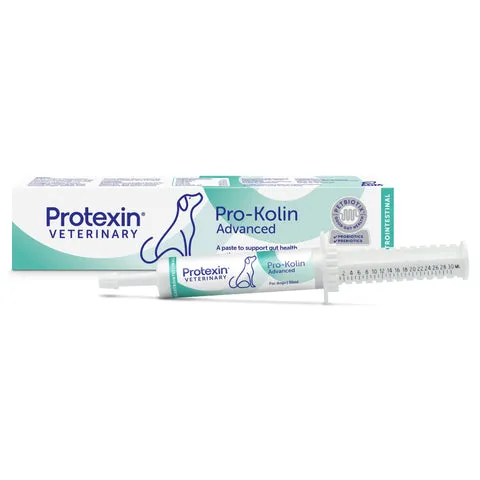
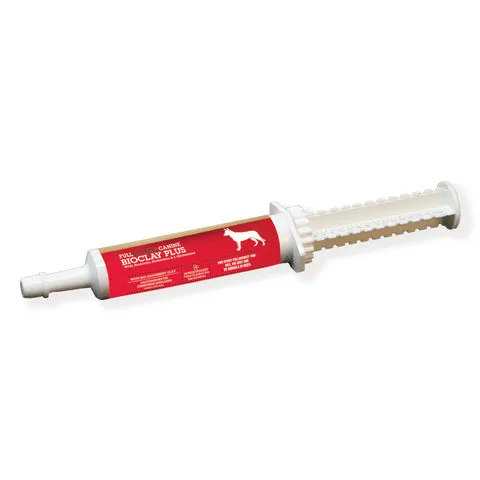 A tube of Full Bucket Health Bioclay+ Paste, a probiotic and clay supplement for canine digestive health.This bioactive clay-based paste is formulated to promote digestive health during occasional distress, making it an excellent choice for acute loose stools. It contains 1.56 Billion CFUs of *Saccharomyces cerevisiae boulardii*, a yeast strain of probiotic that is safe for use alongside antibiotic therapy. While not as extensively studied as some other strains, *Saccharomyces cerevisiae boulardii* is highly valued for its role in maintaining digestive balance. Additionally, it includes L-Glutamine and bio-adsorbent clay to support toxin removal from the gut.
A tube of Full Bucket Health Bioclay+ Paste, a probiotic and clay supplement for canine digestive health.This bioactive clay-based paste is formulated to promote digestive health during occasional distress, making it an excellent choice for acute loose stools. It contains 1.56 Billion CFUs of *Saccharomyces cerevisiae boulardii*, a yeast strain of probiotic that is safe for use alongside antibiotic therapy. While not as extensively studied as some other strains, *Saccharomyces cerevisiae boulardii* is highly valued for its role in maintaining digestive balance. Additionally, it includes L-Glutamine and bio-adsorbent clay to support toxin removal from the gut.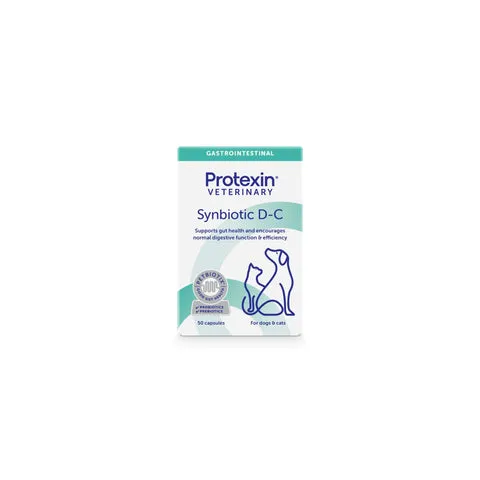 A small box of Protexin Synbiotic D-C capsules, a probiotic and prebiotic supplement for dogs.This product is a top recommendation for gut health, primarily because it contains *Enterococcus faecium (DSM 10663/ NCIMB 10415) 4b1707*. This specific strain is highly effective at repopulating the intestine with beneficial microorganisms, which is critical for firming loose stools. It offers a synbiotic action, combining probiotics and prebiotics without harmful inactive ingredients, and comes in a stable powder form within capsules.
A small box of Protexin Synbiotic D-C capsules, a probiotic and prebiotic supplement for dogs.This product is a top recommendation for gut health, primarily because it contains *Enterococcus faecium (DSM 10663/ NCIMB 10415) 4b1707*. This specific strain is highly effective at repopulating the intestine with beneficial microorganisms, which is critical for firming loose stools. It offers a synbiotic action, combining probiotics and prebiotics without harmful inactive ingredients, and comes in a stable powder form within capsules.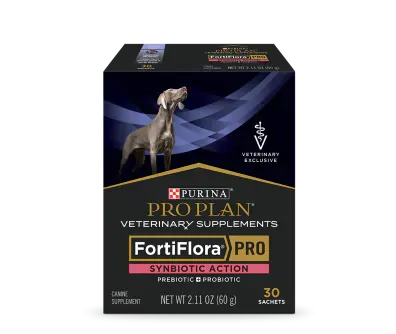 A box of Purina Fortiflora Synbiotic powder packets, a vet-recommended probiotic for dogs.As the number one veterinarian-recommended dog probiotic brand for digestive health (Kantar Veterinary Tracker, 2021), Purina Fortiflora is a trusted choice. Available as a powder, it’s suitable for both puppies and adult dogs. It provides a synbiotic action of prebiotics and probiotics to manage diarrhea and support a healthy microflora. The inclusion of psyllium helps stimulate the growth of *Lactobacillus* and *Bifidobacterium* species, further supporting gut health and leading to firmer stools.
A box of Purina Fortiflora Synbiotic powder packets, a vet-recommended probiotic for dogs.As the number one veterinarian-recommended dog probiotic brand for digestive health (Kantar Veterinary Tracker, 2021), Purina Fortiflora is a trusted choice. Available as a powder, it’s suitable for both puppies and adult dogs. It provides a synbiotic action of prebiotics and probiotics to manage diarrhea and support a healthy microflora. The inclusion of psyllium helps stimulate the growth of *Lactobacillus* and *Bifidobacterium* species, further supporting gut health and leading to firmer stools.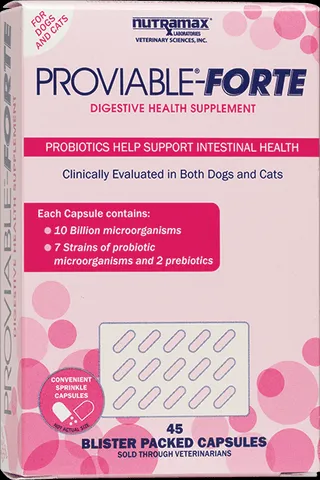 A carton of Proviable Forte sprinkle capsules, showing the dosage for dogs.Proviable Forte delivers a robust 10 billion CFUs per capsule with 7 strains of bacteria aimed at improving intestinal balance. While it provides a diverse range of good bacteria and includes prebiotics to encourage their growth, the consistent efficacy of all 7 strains can vary. However, its ease of administration (capsule contents can be sprinkled over food) makes it a convenient option for many pet owners dealing with loose stools.
A carton of Proviable Forte sprinkle capsules, showing the dosage for dogs.Proviable Forte delivers a robust 10 billion CFUs per capsule with 7 strains of bacteria aimed at improving intestinal balance. While it provides a diverse range of good bacteria and includes prebiotics to encourage their growth, the consistent efficacy of all 7 strains can vary. However, its ease of administration (capsule contents can be sprinkled over food) makes it a convenient option for many pet owners dealing with loose stools.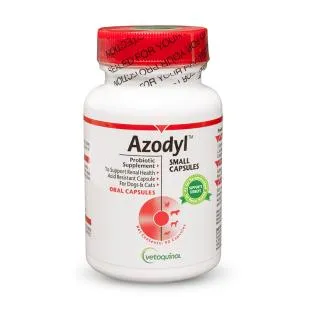 A bottle of Azodyl small capsules for dogs with kidney issues.Azodyl is a specific probiotic formulated to help manage uremic toxins, often leading to improvements in BUN and creatinine levels within four weeks in dogs with renal issues. It contains bacterial strains like *Streptococcus thermophilus KB19*, *Lactobacillus acidophilus KB27*, and *Bifidobacterium longum KB31*, which support a healthy uremic environment. Its acid-resistant capsule ensures the bacteria reach the colon intact for maximum efficacy.
A bottle of Azodyl small capsules for dogs with kidney issues.Azodyl is a specific probiotic formulated to help manage uremic toxins, often leading to improvements in BUN and creatinine levels within four weeks in dogs with renal issues. It contains bacterial strains like *Streptococcus thermophilus KB19*, *Lactobacillus acidophilus KB27*, and *Bifidobacterium longum KB31*, which support a healthy uremic environment. Its acid-resistant capsule ensures the bacteria reach the colon intact for maximum efficacy.